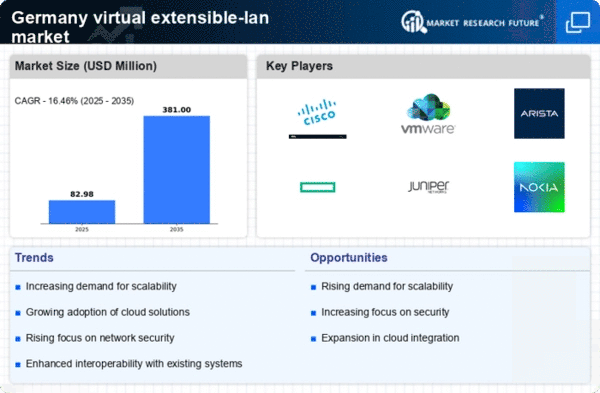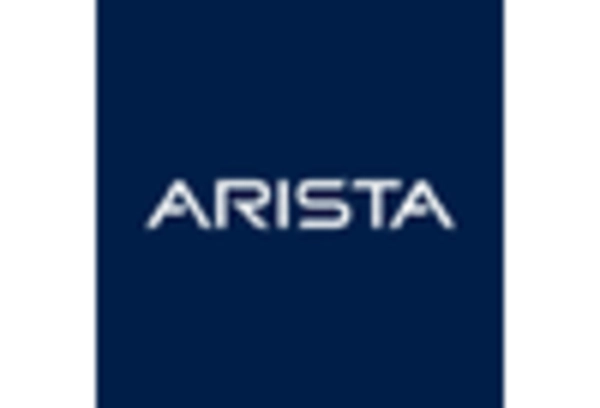Increased Focus on Network Scalability
In the context of the virtual extensible-lan market, scalability has emerged as a crucial driver for businesses in Germany. Organizations are increasingly looking for solutions that can grow alongside their operational needs. The ability to easily expand network capacity without significant infrastructure changes is appealing to many enterprises. This flexibility is particularly important in sectors such as finance and healthcare, where data traffic can fluctuate dramatically. The virtual extensible-lan technology allows for seamless integration of additional resources, which is vital for maintaining performance levels. As a result, the market is likely to see a compound annual growth rate (CAGR) of approximately 20% over the next few years, underscoring the importance of scalability in driving market growth.
Regulatory Compliance and Data Privacy
The virtual extensible-lan market in Germany is influenced by stringent regulatory compliance and data privacy requirements. With the implementation of the General Data Protection Regulation (GDPR), organizations are compelled to adopt networking solutions that ensure data security and privacy. This regulatory landscape drives the demand for virtual extensible-lan technologies, which provide enhanced security features and segmentation capabilities. Companies are increasingly investing in these solutions to mitigate risks associated with data breaches and non-compliance penalties. The market is projected to grow as businesses prioritize compliance, with estimates suggesting an increase in market size by 15% annually. This trend highlights the critical role of regulatory frameworks in shaping the virtual extensible-lan market.
Growing Demand for High-Speed Connectivity
The virtual extensible-lan market in Germany is experiencing increased demand for high-speed connectivity solutions. As businesses increasingly rely on data-intensive applications, the need for robust network infrastructure becomes paramount. This demand is reflected in the projected growth rate of the market, which is expected to reach €1.5 billion by 2026. Companies are seeking to enhance their network capabilities to support remote work and digital transformation initiatives. The virtual extensible-lan technology offers a scalable solution that can accommodate the growing bandwidth requirements, thereby driving its adoption across various sectors. This trend indicates a shift towards more agile and efficient networking solutions, positioning the virtual extensible-lan market as a critical component of Germany's digital economy.
Rise of Remote Work and Collaboration Tools
The shift towards remote work has had a profound impact on the virtual extensible-lan market in Germany. As organizations adapt to new working models, the need for reliable and secure networking solutions has intensified. Virtual extensible-lan technology facilitates seamless connectivity for remote teams, enabling efficient collaboration and communication. This trend is reflected in the increasing investment in digital infrastructure, with companies allocating approximately 30% of their IT budgets to enhance remote work capabilities. The virtual extensible-lan market is poised for growth as businesses seek to optimize their networks to support a distributed workforce. This evolution indicates a long-term shift in how organizations approach networking and collaboration.
Technological Advancements in Networking Solutions
Technological advancements are playing a pivotal role in shaping the virtual extensible-lan market in Germany. Innovations in networking technologies, such as software-defined networking (SDN) and network function virtualization (NFV), are enhancing the capabilities of virtual extensible-lan solutions. These advancements allow for greater flexibility, automation, and efficiency in network management. As organizations seek to modernize their IT infrastructure, the adoption of these technologies is expected to accelerate. The market is likely to witness a growth rate of around 18% annually, driven by the demand for more sophisticated networking solutions. This trend underscores the importance of continuous innovation in maintaining competitiveness within the virtual extensible-lan market.
















